An online forensic science degree can help prepare you to do your part in solving crimes and upholding justice.
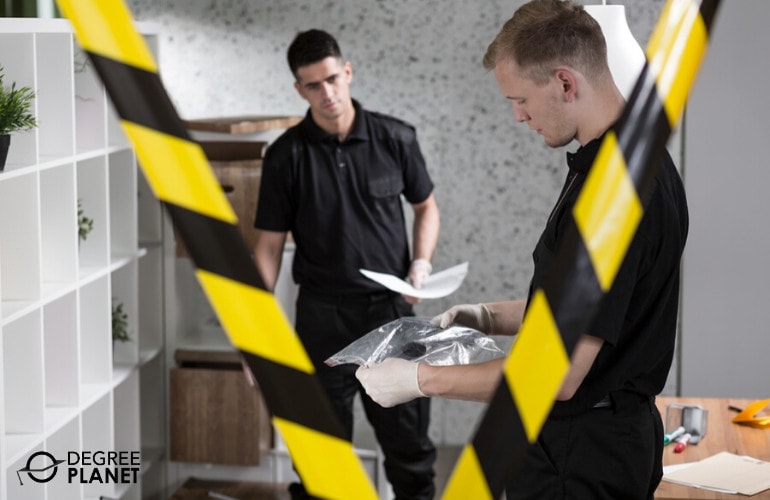
If your goal is to become a crime scene investigator, a lab technician, or a digital forensic analyst, studying for a BS in Forensic Science can be an important step in your professional development.
Editorial Listing ShortCode:
In this program, you’ll learn how to navigate the criminal justice system, investigate crimes, and communicate your findings. You can gain these skills and prepare for your future career through online forensics studies.
Online Forensic Science Degrees
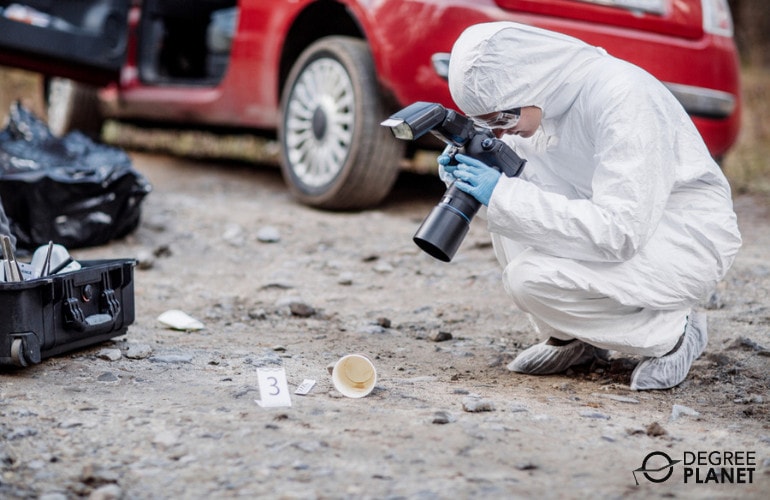
Television shows, books, and movies may have piqued your interest in crime scene investigation, also known as CSI. You can start preparing for a career in this field by earning an online bachelor’s in forensic science.
In this degree program, you’ll take classes about legal matters and the court system. You’ll typically learn how to handle evidence, gather fingerprints, write reports, and investigate causes of death. Additionally, you may take one or more classes on psychology.
Some colleges offer concentrations within the forensic science department. For example, if you choose a digital forensics track, you might take several classes that can help you become more familiar with networking, mobile devices, and operating systems.
In a laboratory sciences concentration, there may be extra courses on biology, chemistry, and genetics.
Editorial Listing ShortCode:
Forensic science graduates tend to pursue careers as forensic scientists. That type of work is also known as being a forensic science technician. Professionals in these positions work at crime scenes or investigate evidence once it’s been brought back to the lab.
Some forensic scientists study specific types of evidence, such as computer files, fire scenes, blood samples, or fingerprints. A background in forensic science could also help you pursue a job as a police officer, a detective, or another law enforcement official.
Some students build on the foundations learned in their forensic science undergraduate programs and continue their education in psychology or medical programs.
3 Things You Can Do with a Forensic Science Degree

Exploring a crime scene might be the first thing that comes to your mind when you think about working in this field. In truth, though, there are a wide variety of opportunities for forensic science graduates.
1. Forensic Scientist
Also known as a forensic science technician, a forensic scientist is a professional who is trained to collect evidence and perform investigations on it. As a forensic scientist, you might work at crime scenes or conduct laboratory analyses.
Depending on your area of expertise, you might specialize in examining biological matter, chemical compounds, fingerprints, computers, or financial records.
2. Crime Scene Investigator
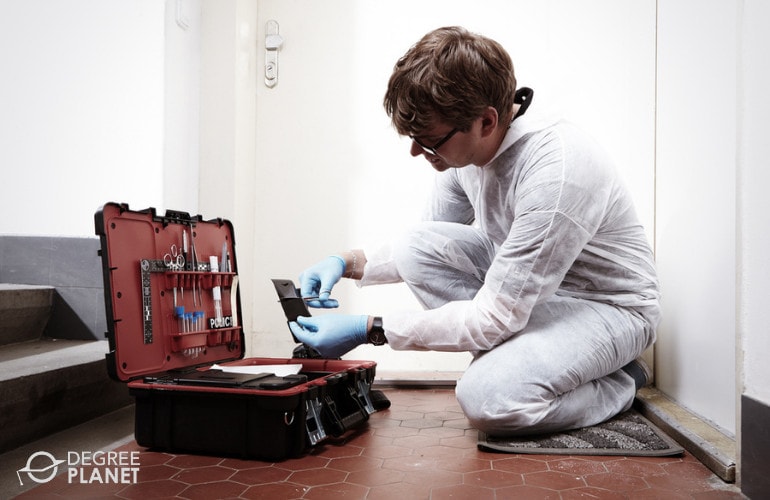
Some forensic scientists spend most of their time visiting crime scenes to observe situations, record notes, and search for evidence. They may then take this evidence back to the lab to learn more about it.
Being familiar with a variety of types of evidence—such as blood splatters, fingerprints, and fluid analysis—could be beneficial in this position.
3. Forensic Computer Investigator
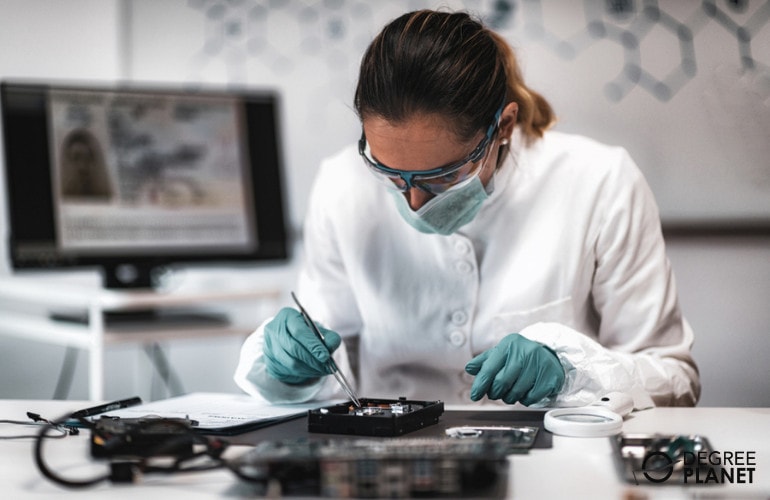
If you’re skilled with technology, you might be interested in contributing to criminal investigations by searching computer systems and other digital devices for incriminating data.
This type of work not only helps convict perpetrators of fraud and identity theft crimes but also provides clues concerning other types of crime.
Forensic Science Careers & Salaries
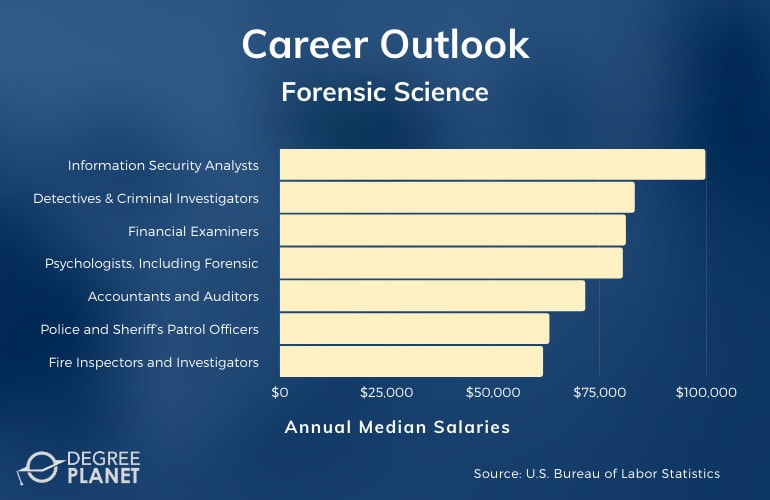
Forensic science graduates work as forensic science technicians in various capacities. Forensic science technician options can include crime scene investigators, who collect evidence in the field, or fire investigators, who search for clues to the cause of a blaze.
Other positions include forensic computer examiners, who uncover information on digital devices, and financial experts, who look for wrongdoing in bookkeeping records.
A forensic science degree could also be a strategic first step toward a career in forensic psychology. Pursuing this field could be an intriguing way to combine interests in both social science and criminal justice.
According to the Bureau of Labor Statistics, forensic science technicians earn an average annual salary of $59,150.
| Careers | Annual Median Salaries |
| Information Security Analysts | $99,730 |
| Detectives and Criminal Investigators | $83,170 |
| Financial Examiners | $81,090 |
| Psychologists, Including Forensic | $80,370 |
| Accountants and Auditors | $71,550 |
| Police and Sheriff’s Patrol Officers | $63,150 |
| Fire Inspectors and Investigators | $61,660 |
| Forensic Science Technicians | $59,150 |
| Clinical Laboratory Technologists and Technicians | $53,120 |
| Private Detectives and Investigators | $50,510 |
Some of these job titles require additional education. For example, forensic psychologists hold graduate degrees, but your bachelor’s degree might allow you to gain experience as an assistant.
Some forensic science students decide to apply their investigatory know-how to other jobs in the criminal justice and security spheres. For example, graduates can pursue careers as police officers or private investigators. If you’re a computer expert, you might use your knowledge of cybersecurity to bolster network protection.
Editorial Listing ShortCode:
There’s a good deal of lab work associated with forensic science, so a background in biology or chemistry can help prepare you to learn how to analyze evidence in laboratory settings.
Forensic Science Curriculum & Courses
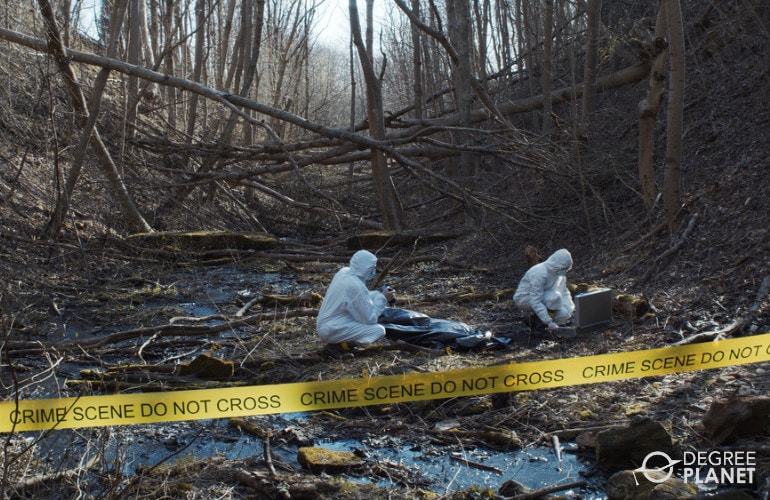
Forensic science degrees require earning about 120 credit hours. While those credits will come from departments throughout the school, many of your courses will be focused on forensic science topics. They may include:
- Advanced Biology for Forensics: You’ll take one or more biology classes that cover topics like cells and genetics.
- Blood and Human Remains: In this class, you’ll study how to draw clues from blood spatters, bones, and other body parts.
- Conducting Interviews: In addition to textbook learning on speaking to witnesses and suspects, you may also get to practice these skills on classmates.
- Crime Scene Procedures: This course covers taking notes at a crime scene, snapping photographs, and collecting pieces of evidence while ensuring that legal and ethical practices are maintained.
- Criminology: You’ll study criminal thinking and behavior in this class and discuss methods of reducing or preventing crime.
- Death Investigations: This course provides an overview of identifying remains, gathering evidence at crime scenes, and considering a victim’s cause of death.
- Digital Crime and Investigations: Studies in computing will introduce you to ways that technology is used for criminal purposes and also teach you to search computers and other devices for evidence.
- Fingerprints: Through lessons and lab experiences, you can learn to read fingerprints and compare one sample to another.
- Forensic Science Fundamentals: An introductory class will start your studies in the forensic science department with an overview of topics like jurisdiction, ethics, and evidence collection.
- Procedures for Evidence: In this class, you’ll talk about how to handle physical evidence and also how to work with witnesses.
If you have a particular career goal in mind or hope to enter a graduate program, you might consider pursuing a concentration or electives that will support those plans.
How to Become a Forensic Scientist

In general, a bachelors degree is the standard educational requirement for entering a forensic science career.
Here’s a brief rundown of how to get started in this field:
- Undergraduate degree. After earning your high school diploma, you can pursue an associate degree or, preferably, a bachelor’s degree in forensic science or a related field, such as criminal justice or biology.
- Internship. You can look for internship opportunities during your schooling.
- Job applications. Once you graduate, you can apply for jobs with crime labs, police departments, hospitals, or government agencies.
- On-the-job training. You’ll gain additional training on the job under the supervision of experienced forensic scientists.
- Certification. If needed in your jurisdiction, you can apply for certification so you can work independently.
After you get your career off the ground, you can still take steps toward greater professional skills and responsibilities. Many jurisdictions do not require any sort of licensure, but you might want to pursue national board certification as an impressive addition to your resume.
You may also consider advancing your career by entering a graduate program. Both certificate programs and masters degrees in forensic science are available.
Admissions Requirements

Not all bachelors degree programs need to see ACT or SAT scores before they’ll let you in. Instead, colleges may use application materials like the following to determine whether you’re a good fit for their online forensic science programs:
- Essay about your characteristics, experiences, or career goals
- High school or college transcripts that meet minimum GPA requirements
- Letters of reference from past teachers, bosses, or others in authority positions
Different schools have different admissions requirements. So, if you don’t meet the qualifications for one school, you can always take a look at another option instead.
Accreditation
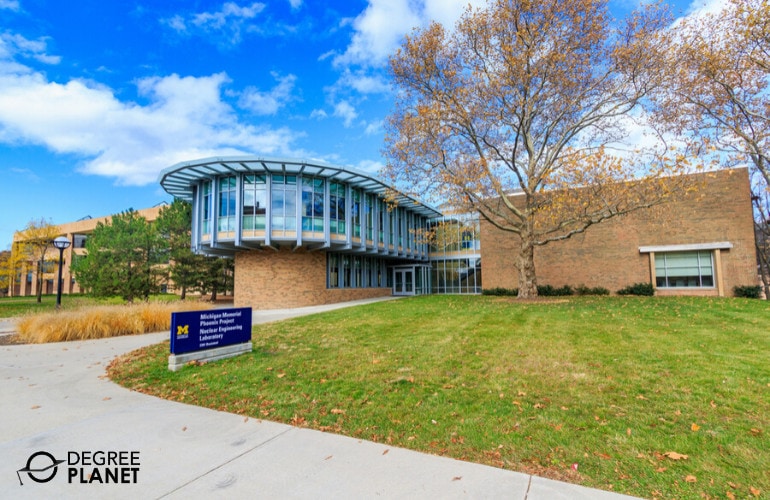
Employers want to hire well-prepared candidates, so they may look to see whether your online forensics degree came from a regionally accredited school.
Regional accreditation is an official approval process in which an authorized accreditor evaluates a college to determine whether it educates students well.
Editorial Listing ShortCode:
Choosing a regionally accredited university isn’t only valuable during job searches. It can also boost other schools’ confidence in your education, which can be invaluable when transferring credits or beginning a graduate program.
Financial Aid and Scholarships

Student aid programs through your state and the federal government may help you afford a criminal forensics degree, if you qualify.
After filling out the Free Application for Federal Student Aid (FAFSA), students may qualify for loans with low interest rates, grants that provide free cash, or work-study programs.
Private funding can reduce your college costs as well. This may include tuition reimbursement from your employer, scholarships through your school, and scholarships or fellowships from outside sources.
Professional Forensic Science Organizations

Forensic science professionals can learn a great deal from one another, and belonging to an industry organization is a strategic way to connect with others.
You may sometimes gather with other members at local or national events. At other times, your engagement can come through magazine articles, online seminars, message boards, or other networking tools.
Here are some of the professional organizations in the forensic science field:
- American Academy of Forensic Sciences
- American Board of Criminalistics
- American Society of Crime Laboratory Directors
- Chartered Society of Forensic Sciences
- Consortium of Forensic Science Organizations
In addition to meetings, articles, and online training sessions, some organizations also offer resources like scholarships and professional discounts.
How Long Does It Take to Get a Forensic Science Degree Online?

It often takes students about 4 years to earn the typical 120 credits needed for a bachelors degree. This timeframe is based on full-time enrollment and the traditional college calendar of 16 week semesters. Online colleges don’t always stick with the traditional semester format, though.
Some online programs break up the school year into shorter terms. With this approach, you may take only 1 or 2 classes at a time and switch courses every 8 weeks or so. You can even continue taking courses throughout the year. With an accelerated approach like this, you might be able to finish in less time.
What Degrees Do You Need to Be a Forensic Scientist?
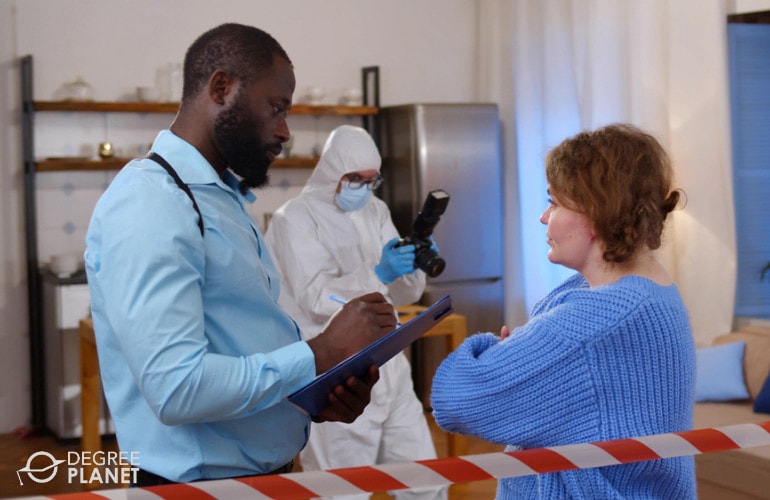
According to the Bureau of Labor Statistics, most jobs in forensic science request that applicants have at least a bachelor’s degree. A forensic science major is one way to meet this educational requirement. You can also get a criminal justice degree with a concentration in forensic science.
Another option is to major in one of the hard sciences, such as biology or chemistry, and take electives related to forensic science. A masters in the field is often required for the position of forensic psychologist, and going to medical school may be needed to pursue a career in forensic pathology.
How Much Does a Forensic Scientist Make?

According to the Bureau of Labor Statistics, forensic science technicians usually earn between $35,620 and $97,350 annually. The average salary for this occupation is $59,150.
Government jobs pay some of the highest wages for forensic science technicians. The average salary is $60,830 for state government agencies and $59,840 for local government. Testing laboratories pay forensic science technicians an average annual salary of $55,100.
Editorial Listing ShortCode:
Detectives and criminal investigators sometimes have forensic science backgrounds. Those jobs usually pay between $44,860 and $139,180 each year. Some graduates pursue careers as financial examiners. Federal government financial examiners who work for the federal government earn average salaries of $121,060 annually.
How Long Does It Take to Become a Forensic Scientist?
Getting a bachelor’s degree in forensic science typically takes around 4 years. Earning your degree online may allow you to complete your program sooner. Graduates can often qualify for entry-level jobs in forensic science right out of college, but you can expect to receive continued on-the-job training for the first several months.
Supervisors often teach you the organization’s particular practices for gathering evidence or analyzing lab samples. Some states require you to complete a certification process before you can work independently or supervise new professionals.
How Much Money Does a Crime Scene Investigator Make?

The Bureau of Labor Statistics states that a crime scene investigator, also known as a criminalist, is a type of forensic science technician. On average, forensic science technicians earn $59,150 each year. The top earners make more than $97,350.
State agencies often have the highest-paying crime scene investigation jobs. The average salary for those jobs is $60,830, which is slightly higher than the average for all forensic science technicians. Local government jobs come in as a close second.
Is a Bachelor’s Degree in Forensic Science Worth It?

Yes, a bachelors degree in forensic science is worth it for many students. Through the field of forensic science, you may contribute to the pursuit of justice.
The Bureau of Labor Statistics predicts that the number of positions for forensic science technicians will grow by 14% through the next decade. This is much faster than the national average for job growth.
Professionals in this field also work in law enforcement, forensic accounting, or fire investigation. With projected 8% job growth, fire inspection is another rapidly expanding job category.
Universities Offering Online Bachelors in Forensic Science Degree Programs
Methodology: The following school list is in alphabetical order. To be included, a college or university must be regionally accredited and offer degree programs online or in a hybrid format.

Colorado Technical University offers a Bachelor of Science in Criminal Justice with a concentration in Forensic Investigation. This is an online program that allows for flexible scheduling. Coursework covers law enforcement operations and report writing, criminal law, criminal procedure, the laws of evidence, and crime scene documentation.
Colorado Technical University is accredited by the Higher Learning Commission.
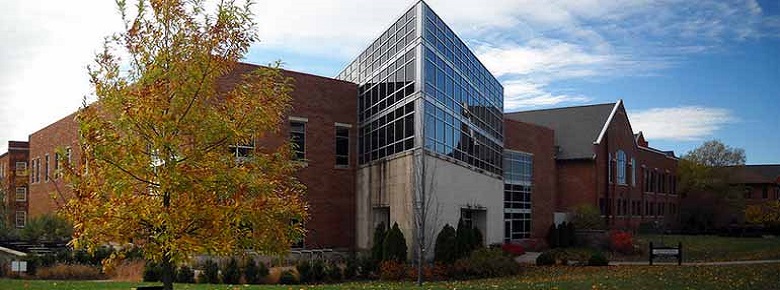
Columbia College has an online undergraduate program in criminal justice. Classes are available in the evenings. Students can choose between a general track and a forensic track. The degree is intended for students who want to work in fields such as law enforcement, corrections, homeland security, and emergency management.
Columbia College is accredited by the Higher Learning Commission.

Hampton University offers a concentration in forensic chemistry within the chemistry program. Students should declare intent to pursue the forensic chemistry option at the beginning of their sophomore year. This program is available online and on campus and is designed to prepare students for work in forensic laboratories.
Hampton University is accredited by the Southern Association of Colleges and Schools Commission on Colleges.

At Liberty University, students can pursue a BS in Criminal Justice with a concentration in Crime Scene Investigation. The program is 120 credit hours, and students take an average of 3.5 years to complete it. It is 100% online, with courses taking just 8 weeks. Students can transfer up to 75% of their qualifying credits.
Liberty University is accredited by the Southern Association of Colleges and Schools Commission on Colleges.
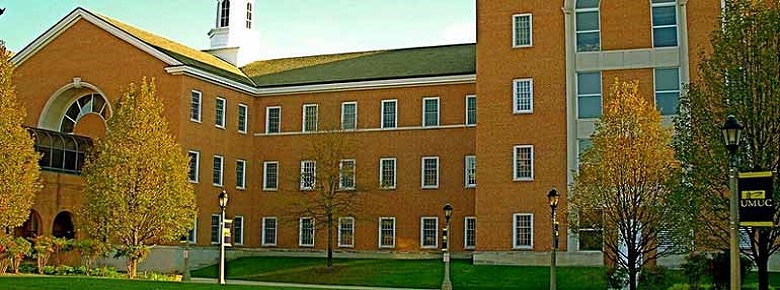
The University of Maryland Global Campus offers a Bachelor’s in Investigative Forensics. This is an online program, but select courses may be available in a hybrid format. The program is 120 credit hours, and students can transfer up to 90 qualifying credit hours.
Coursework covers criminal procedure and evidence, criminalistics, crime scene investigation, and cybercrime.
University of Maryland Global Campus is accredited by the Middle States Commission on Higher Education.
Getting Your Forensic Science Degree Online

Forensic science is a growing field that needs qualified professionals. An online bachelor’s degree in forensic science can help you prepare for career opportunities in this field.
Not only is forensic science an in-demand field, but it also consists of intriguing work opportunities that can contribute to the pursuit of justice. Whether you want to study fingerprints, blood samples, fire patterns, or digital data, there may be a role for you in forensic science.
If you’re ready to study forensic science, you may want to consider enrolling in an online program. At an accredited online school, you can earn a forensic science degree, for example a computer forensics degree online, on a schedule that works for you.
After you complete your bachelors degree, it may be worth it to continue on at the graduate level and earn a masters in forensic psychology online.

